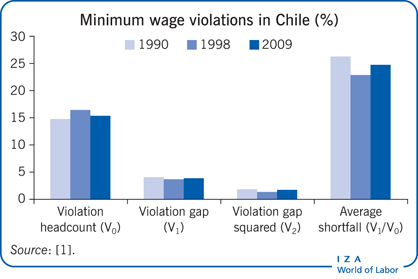Elevator pitch
The level of compliance with minimum wage laws often depends on factors specific to each labor market. In most developing countries, a substantial share of workers still earns less than the legal minimum. Enforcement has not kept up with growth in regulations to protect workers from low wages and poor working conditions. Several institutional structures shape enforcement, including the role of labor inspectors and approaches to compliance, and these and other variables can be analyzed to explore their effects on the level of minimum wage violations.
Key findings
Pros
Minimum wage enforcement and compliance are low in developing countries.
An index of minimum wage violation would enable policymakers and researchers to analyze the level and depth of non-compliance and act accordingly.
Four sets of variables help in understanding the factors that influence minimum wage violations.
Alternative approaches to increasing compliance would shift the focus from firms’ financial incentives toward interventions that shape enforcement efforts.
A template can help derive measures and formulate strategies to establish a more conducive environment for minimum wage enforcement and compliance.
Cons
If data on enforcement and compliance are scarce, finding appropriate measures for both is problematic.
The minimum wage can result in substantial unemployment and other economic costs that compliance and enforcement may reinforce.
While careful planning of enforcement strategies is necessary, lack of skills and resources often determines enforcement practice.
Policymakers need to consider the country’s policy goals before increasing the number of inspectors; raising their number will not necessarily raise compliance rates.
Enforcement in a severely resource-constrained environment is difficult when minimum wage regulations are complex.
